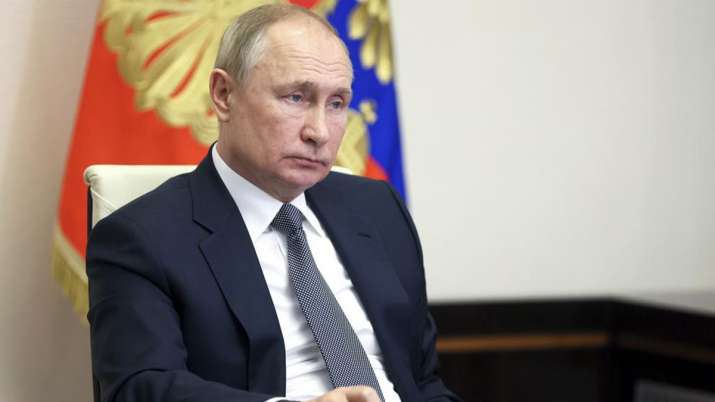Russia President Vladimir Putin.
Highlights
- Putin must rule a country he has conquered against his will.
- Educated and affluent Ukrainians have a particularly low tolerance of inequality in the distribution of power.
- Ukrainian national culture was suppressed and discredited by Russia during the Soviet Union era.
New Delhi: Anton Olenik, Newfoundland Memorial University, St. Jones, Canada, (The Conversation): Ukrainian resistance to Russian aggression has been so fierce since Vladimir Putin invaded Ukraine that questions have arisen about whether Putin would be able to rule Ukraine even if he was successful in winning the war militarily. There are many reasons to believe that he would not be able to do so. Even if he is victorious, Putin will not be able to achieve what he wants because to be completely victorious, he must rule a country he has conquered against his will.
How well a country is governed depends on its culture, more precisely, on how compatible its culture is with its model of government. The late American political scientist Harry Eckstein, an expert on political culture, once argued that governments perform well if their systems of authority are similar to those of a governed society. In stable democracies, all organizations, including families, have some element of democratic governance. Conversely, in autocracy, power is centralized at all levels of social organization.
According to a popular concept in Russia, the ruler of the nation is expected to act like the father of a family. The concept of power distance, originally proposed by Dutch social psychologist Geert Hofstad, helps to measure the extent to which inequality in the distribution of power is socially accepted. The larger the value of the power distance index, the more inequality is accepted, although Hofstad was mostly interested in the distribution of power within companies.
An in-depth comparative study of the perception of power conducted in Russia and Ukraine in 2015-16 shows that Ukrainians and Russians perceive power differently. The power distance index in Ukraine has a value of 100.9, compared to 110.7 in Russia. Educated and affluent Ukrainians have a particularly low tolerance of inequality in the distribution of power. Putin’s possible regime in Ukraine is problematic because it will not match the model of power that Ukrainians want to accept. Skepticism and rejection of autocratic power is deeply rooted in Ukrainian culture.
Influence of the Cossacks Ukraine’s most famous historian, Mykhailo Hrushevsky, considers the Cossacks of the 15th and 16th centuries to be the precursors of modern Ukraine. The Cossacks (border militia hired by the Polish and Russian governments to ward off Tatar attacks) were famous for causing trouble for any ruler, including Poles, Tatars and Russians. Hrushevsky described the Cossacks as a ‘people who have no rights’. Even the Poles, who had their own problems with the concept of centralized power, called the Cossacks ‘unruly’.
The military leader of the Cossacks was chosen and could easily be changed. After a military loss, the Cossacks usually gathered and elected a new leader. None of them had permanent power. Does the Cossack heritage still influence the culture of Ukraine, at least as far as the perception of power and those who hold it are concerned? The fierce resistance the Ukrainian military is showing against its Russian invaders suggests that this may happen.
Ukrainian national culture was suppressed and discredited by Russia during the Soviet Union era. This may explain Putin’s allegations that Ukrainians are ruled by ‘nationalists and neo-Nazis’. Elements of Cossack culture were revived during mass protests in 2013–14 against the former Ukrainian president’s attempts to replicate Putin’s style of governance. The demonstrators organized their tent camp in the center of Kyiv on the lines of the organizational and spatial method of Cossack military camps.
War Builds Nation War often acts as a trigger for the revival of the nation’s consciousness. British historical sociologist Anthony D. Smith, an expert on nations and nationalism, who died in 2016, wrote that war is ‘one of the most powerful factors in the formation of both nations and ethnic communities in every period of history.’ This was precisely the effect of the 2014-15 military confrontation in eastern Ukraine and Crimea. Today’s full-fledged war waged by Putin is hardly an exception.
This will likely lead the situation to an outcome that Putin could not have imagined, the rejection of autocratic rule by the Ukrainians. If one puts Ukraine and Russia on the continuum of autocracy from anarchy, Ukraine will be closer to anarchy while Russia to autocracy. Russia has always been a power-centric society, where all important decisions are expected to be taken by a few or ideally by a single one. The alignment of Putin’s regime with the notion of power inherent in Russian culture explains its exemplary stability, at least so far.
Large-scale protests against the invasion of Ukraine in several Russian cities point to growing discontent. However, Russia and Ukraine appear to be almost complete opposites, reducing the likelihood that Putin’s Russia will be able to rule Ukraine in a friendly manner, even if it wins the war. The war in Ukraine confirms that for Russia, power means force. It would be a very difficult task, if not impossible, for Putin to transfer that mindset to Ukrainians.
